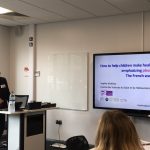The Department of Psychology at Staffordshire University is delighted to announce a further funded student bursary for the highly successful Professional Doctorate in Health Psychology programme.
University is delighted to announce a further funded student bursary for the highly successful Professional Doctorate in Health Psychology programme.
The two-year bursary is for £14,000 per annum for a full-time trainee, which is inclusive of course fees and a contribution towards living and study costs. The bursary is in partnership with Leicester City Primary Pupil Referral Unit, working within the Primary Social, Emotional and Mental Health (SEMH) Team. The role at the PRU will be combined with training at Staffordshire University on the Professional Doctorate in Health Psychology course.
Dr Rachel Povey, Co-Director of the Professional Doctorate in Health Psychology said:
“We are very excited about this new collaborative partnership with Leicester City Primary Pupil Referral Unit. This represents another exciting opportunity for a Trainee Health Psychologist to work in an applied environment and complete their competency training.”
Further details about the bursary is available via this link. Applicants should be due to be awarded their BPS Accredited Stage 1 Health Psychology training by 19th September 2018 (further details about the eligibility criteria for this exciting opportunity can be found via the bursary advert). For further information about this exciting opportunity, please contact Dr Rachel Povey (r.povey@staffs.ac.uk).
Please note that the closing date for applications for the bursary is noon on Thursday 14th June 2018.
Staffordshire University – The Home of Health Psychology
Staffordshire University’s Centre for Health Psychology is a  centre of excellence for teaching and research in Health Psychology, and is home to Staffordshire’s BPS Accredited Stage 1 MSc in Health Psychology and Stage 2 Professional Doctorate in Health Psychology. The Centre for Health Psychology is part of the Staffordshire Centre for Psychological Research.
centre of excellence for teaching and research in Health Psychology, and is home to Staffordshire’s BPS Accredited Stage 1 MSc in Health Psychology and Stage 2 Professional Doctorate in Health Psychology. The Centre for Health Psychology is part of the Staffordshire Centre for Psychological Research.
Keep updated with the latest Health Psychology news from Staffordshire University via following us on @StaffsPsych and via the #HealthPsychStaffs hashtag.
For further information about Health Psychology courses and research at Staffordshire University please visit the following webpages:































